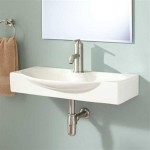What Is The Best Bathroom Sink Material?
Choosing the right bathroom sink material is an important decision that affects both the aesthetics and functionality of your bathroom. The material you choose will impact its look, durability, maintenance needs, and even the overall cost. With a wide variety of options available, understanding the pros and cons of each material is crucial for making an informed choice. This article will explore the most common bathroom sink materials, highlighting their unique characteristics to help you determine the best fit for your bathroom.
Ceramic
Ceramic, particularly porcelain, remains a popular choice for bathroom sinks. Known for its classic elegance and versatility, ceramic offers a smooth, non-porous surface that is easy to clean and resist stains. Ceramic sinks are typically available in a vast range of colors and designs, allowing for customization to match any bathroom style. Additionally, ceramic sinks are generally affordable, making them a budget-friendly option. However, ceramic is susceptible to chipping and cracking, especially with heavy impact. While durable, ceramic sinks can be prone to scratches and require careful handling.
Porcelain
Similar to ceramic, porcelain is a durable and elegant option for bathroom sinks. It is known for its smooth, glossy finish and resistance to stains and scratches. Porcelain is also a good choice for bathroom sinks because it resists bacteria and mildew, making it a hygienic option. While porcelain is typically more expensive than ceramic, its durability and elegance make it a worthwhile investment. However, like ceramic, porcelain can be prone to chipping and cracking with heavy impact.
Cultured Marble
Cultured marble, a composite material comprised of crushed marble mixed with resin, is a popular choice for bathroom sinks due to its affordable price point and versatility. It offers a smooth, non-porous surface that is resistant to stains and easy to clean. Cultured marble sinks are also available in a variety of colors and designs, allowing for customization to fit different bathroom styles. One of the main advantages of cultured marble is its durability, as it is less prone to chipping and cracking than ceramic. However, cultured marble can be susceptible to scratches and may not withstand extreme heat.
Glass
Glass bathroom sinks offer a modern and elegant look, adding a touch of luxury to any bathroom. Glass is a non-porous material, making it highly resistant to stains and bacteria. However, glass is a delicate material and can be prone to scratches and breakage, requiring careful handling. While glass sinks can be cleaned easily, they may show water spots if not dried thoroughly after each use. Additionally, glass sinks tend to be more expensive than other materials.
Stainless Steel
Stainless steel, an increasingly popular choice for bathroom sinks, offers a modern and durable option. Stainless steel is highly resistant to scratches and dents, making it a practical choice for busy bathrooms. It is also non-porous, which prevents the growth of bacteria and mildew, promoting hygiene. Stainless steel sinks are relatively easy to clean and maintain, requiring minimal effort to keep them looking their best. However, stainless steel can be prone to water spots and may show fingerprints, requiring regular cleaning. Additionally, stainless steel sinks tend to be more expensive than ceramic or cultured marble options.
Stone
Natural stone, such as granite or marble, offers a unique and luxurious look for bathroom sinks. These materials are known for their durability, resistance to stains and scratches, and natural beauty. Each piece of stone is unique, adding a touch of individuality to your bathroom. However, natural stone sinks require specialized care and maintenance, including regular sealing to protect against stains and scratches. Additionally, natural stone sinks are typically the most expensive option, making them a luxury investment.
Solid Surface
Solid surface bathroom sinks are made from a non-porous material that is resistant to stains, scratches, and bacteria. They are available in a wide range of colors and designs, allowing for customization to fit your bathroom design. Solid surface sinks are also durable and easy to clean, making them a practical and stylish option for many homeowners. However, solid surface sinks can be susceptible to heat damage and may require professional repair if they are scratched or chipped. Additionally, solid surface sinks are generally more expensive than ceramic or cultured marble options.
The best bathroom sink material for you will depend on your individual needs, budget, and preferences. Consider factors such as durability, ease of maintenance, style, and cost when making your decision.

A Guide To Materials And Finishes For Bathroom Design Cafe

What Material To Choose For Your Bathroom Washbasin Tips Riho

What Is The Best Material For Bathroom Cabinets Comparison Of Several Commonly Used Materials

What Material To Choose For Your Bathroom Washbasin Tips Riho

Choosing The Best Sink Material For Your Home Newhomesource
What Are The Best Materials For Bathroom Vanity Countertops Toulmin Kitchen Bath Custom Cabinets Kitchens And Design Remodeling In Tuscaloosa Birmingham Alabama

What Are The Best Materials For Bathroom Vanities

What Material To Choose For Your Bathroom Washbasin Tips Riho
:strip_icc()/102130266-3174ac7d31314c7abfc80a1b65a11dd6.jpg?strip=all)
18 Luxurious Bathroom Countertop Ideas For All Budgets

Bathroom Sink 101
Related Posts







